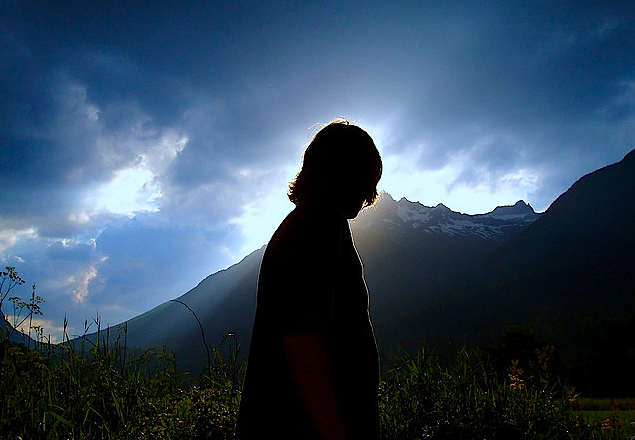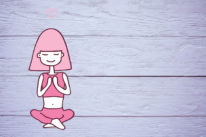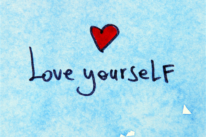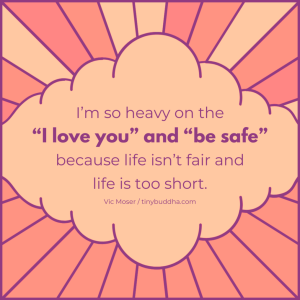
“You must love in such a way that the person you love feels free.” ~Thich Nhat Hanh
Do I really love them, or am I simply afraid to be without them? Is my love an expression of freedom, or is it merely a mask that hides my insecurities? These are questions that haunted my awareness. What is love, if I am afraid to lose it?
It seemed that I was running in circles trying to catch something that was never there.
I felt as if my love was not love, but rather just a fear that saw myself as unlovable; thus I attempted to complete my self-love through finding others to love me. However, it wasn’t working.
It seemed that no matter how much another person loved me, whether it was my wife, family, or friends, it didn’t complete the love I was searching for.
Then it hit me, like a two year old who unexpectedly smacks you across the face: If I were looking to find love within myself, what good would it do to rely on the love of another person?
For if I did, then the moment they stopped loving me, I would be back where I started in the space where love felt lost.
I wondered what it would mean to love myself without needing a love that existed outside what I am.
I recognized that I’d manipulated other people with the hope that they would love me. I’d tried to create stories that made me seem better than other people, always knowing deep down that I was only pretending. I was looking to trick people into liking me, loving me.
However, when I was insincere, when I was only telling people what they wanted to hear so they’d like me, what was it that they loved—me, or a lie?
What good was it if they loved a pretend me, rather than the real me? If I was pretending to be something I was not, then they didn’t love me, but rather someone who existed in the imagination of my mind.
This game of seeking love through pretending got me nowhere, so I asked myself: What does it really mean to love someone as they are? I mean really, am I loving someone as they are, or am I loving a pretend version of who I hope them to be?
What is this love that truly loves, and doesn’t play a game that wants people to change in order to become lovable in the future?
As a society, our love is often the kind that says, “I will only love you if…” How could this be love? If we put conditions on it, then it is not really love.
It reminds me of the love I have for my daughters.
It’s a love that says, “Regardless of what you do or don’t do, I love you all the same. There is nothing you can do that will take this love away; even if you hate me, I will still love you.”
If I were to say, “I will love you only if you make me feel like a good father and not make me look like a bad father,” this wouldn’t be love; it would be manipulation.
It would be an effort to keep hidden the love I withhold from myself.
It would reinforce the belief that I am not lovable unless I change, unless I become something other than what I am. These conditions I put on other people, before I extend love to them, are similar to the conditions I place on myself.
So what would it mean to really love someone? It could only mean that I love them as they are, not as who I think they should be.
If this is true, then the love I am searching for means loving myself as I am now, and not as some future self that exists in the future, in an imaginary tomorrow.
I love my children in such a way that they feel free, in the sense that they know it would be impossible to lose my love for them. I love them in a way that gives them the freedom to be what they are, and not be caught up in a quest to change into more lovable versions of themselves.
This, of course, makes me reexamine the love I have for all those I claim to love. Do I love them as they are, regardless of what flows through them; or am I using love to control them with the hopes that they don’t make me feel insecure?
Do I love them, or am I merely hiding from my own lack of self-love?
If I love my partner, it can only mean that I love them as they are. For if I want them to change, then my love becomes conditional—and that’s not love, but rather an expression of fear.
This is the love I’ve been searching for: to love myself as I am; to realize that I don’t have to change in order to be more whole, or more lovable. I am lovable as I am. I am free.
At anytime I am without this self-love, it means that I am putting a condition on love, by saying that what I am right now is unlovable, and I must change. However, it simply isn’t true. It’s a judgment that attempts to compare myself with another person, or the pretend version of me in my mind.
The truth of the matter is that we are all doing the best we can with what we have. When we love ourselves with conditions, it puts us in a position where love can be given and taken away, thus we find ourselves with anxiety about living up to this condition we’ve created in our mind.
Unconditional love means loving ourselves in such a way that we feel free to be what we are now, in this moment.
Photo by julipan
About Tigmonk
Tigmonk is a 31-year-old modern day Mystic. His greatest joy is in sharing meaningful Insight & Wisdom with Sincere Individuals who seek a Sacred Truth. He is the author of “An Explosion of Love; the Color of All Things Beautiful,” and shares Freely on his website Articles and Audio Recordings. Visit him on Facebook and YouTube.
- Web |
- YouTube |
- More Posts













 Though I run this site, it is not mine. It's ours. It's not about me. It's about us. Your stories and your wisdom are just as meaningful as mine.
Though I run this site, it is not mine. It's ours. It's not about me. It's about us. Your stories and your wisdom are just as meaningful as mine.